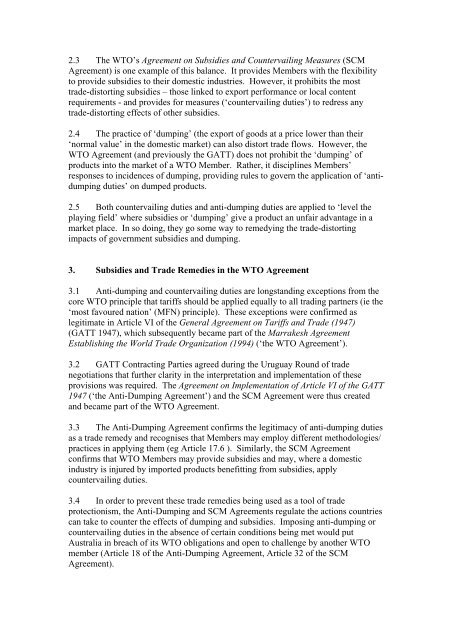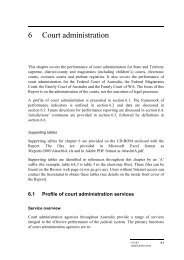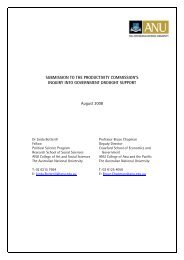Department of Foreign and Trade (PDF - 43 Kb) - Productivity ...
Department of Foreign and Trade (PDF - 43 Kb) - Productivity ...
Department of Foreign and Trade (PDF - 43 Kb) - Productivity ...
You also want an ePaper? Increase the reach of your titles
YUMPU automatically turns print PDFs into web optimized ePapers that Google loves.
2.3 The WTO’s Agreement on Subsidies <strong>and</strong> Countervailing Measures (SCM<br />
Agreement) is one example <strong>of</strong> this balance. It provides Members with the flexibility<br />
to provide subsidies to their domestic industries. However, it prohibits the most<br />
trade-distorting subsidies – those linked to export performance or local content<br />
requirements - <strong>and</strong> provides for measures (‘countervailing duties’) to redress any<br />
trade-distorting effects <strong>of</strong> other subsidies.<br />
2.4 The practice <strong>of</strong> ‘dumping’ (the export <strong>of</strong> goods at a price lower than their<br />
‘normal value’ in the domestic market) can also distort trade flows. However, the<br />
WTO Agreement (<strong>and</strong> previously the GATT) does not prohibit the ‘dumping’ <strong>of</strong><br />
products into the market <strong>of</strong> a WTO Member. Rather, it disciplines Members’<br />
responses to incidences <strong>of</strong> dumping, providing rules to govern the application <strong>of</strong> ‘antidumping<br />
duties’ on dumped products.<br />
2.5 Both countervailing duties <strong>and</strong> anti-dumping duties are applied to ‘level the<br />
playing field’ where subsidies or ‘dumping’ give a product an unfair advantage in a<br />
market place. In so doing, they go some way to remedying the trade-distorting<br />
impacts <strong>of</strong> government subsidies <strong>and</strong> dumping.<br />
3. Subsidies <strong>and</strong> <strong>Trade</strong> Remedies in the WTO Agreement<br />
3.1 Anti-dumping <strong>and</strong> countervailing duties are longst<strong>and</strong>ing exceptions from the<br />
core WTO principle that tariffs should be applied equally to all trading partners (ie the<br />
‘most favoured nation’ (MFN) principle). These exceptions were confirmed as<br />
legitimate in Article VI <strong>of</strong> the General Agreement on Tariffs <strong>and</strong> <strong>Trade</strong> (1947)<br />
(GATT 1947), which subsequently became part <strong>of</strong> the Marrakesh Agreement<br />
Establishing the World <strong>Trade</strong> Organization (1994) (‘the WTO Agreement’).<br />
3.2 GATT Contracting Parties agreed during the Uruguay Round <strong>of</strong> trade<br />
negotiations that further clarity in the interpretation <strong>and</strong> implementation <strong>of</strong> these<br />
provisions was required. The Agreement on Implementation <strong>of</strong> Article VI <strong>of</strong> the GATT<br />
1947 (‘the Anti-Dumping Agreement’) <strong>and</strong> the SCM Agreement were thus created<br />
<strong>and</strong> became part <strong>of</strong> the WTO Agreement.<br />
3.3 The Anti-Dumping Agreement confirms the legitimacy <strong>of</strong> anti-dumping duties<br />
as a trade remedy <strong>and</strong> recognises that Members may employ different methodologies/<br />
practices in applying them (eg Article 17.6 ). Similarly, the SCM Agreement<br />
confirms that WTO Members may provide subsidies <strong>and</strong> may, where a domestic<br />
industry is injured by imported products benefitting from subsidies, apply<br />
countervailing duties.<br />
3.4 In order to prevent these trade remedies being used as a tool <strong>of</strong> trade<br />
protectionism, the Anti-Dumping <strong>and</strong> SCM Agreements regulate the actions countries<br />
can take to counter the effects <strong>of</strong> dumping <strong>and</strong> subsidies. Imposing anti-dumping or<br />
countervailing duties in the absence <strong>of</strong> certain conditions being met would put<br />
Australia in breach <strong>of</strong> its WTO obligations <strong>and</strong> open to challenge by another WTO<br />
member (Article 18 <strong>of</strong> the Anti-Dumping Agreement, Article 32 <strong>of</strong> the SCM<br />
Agreement).

















